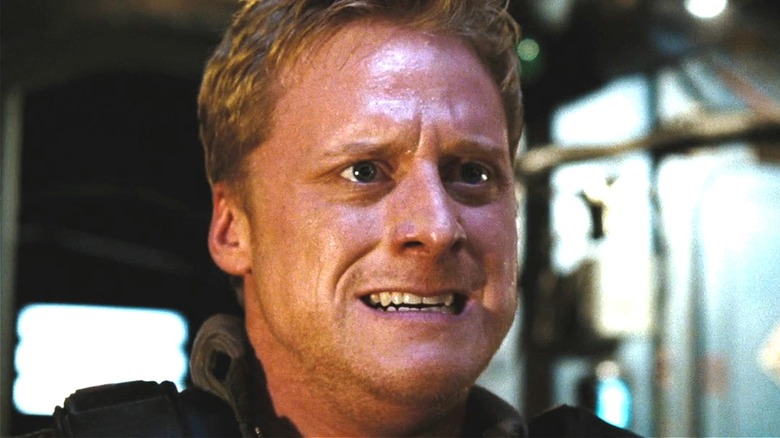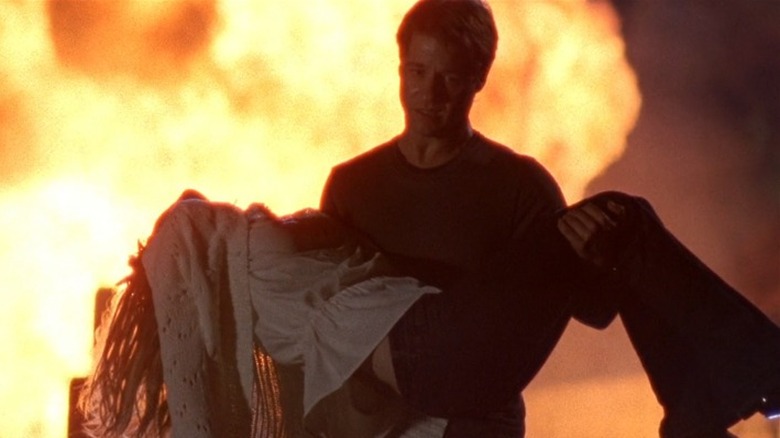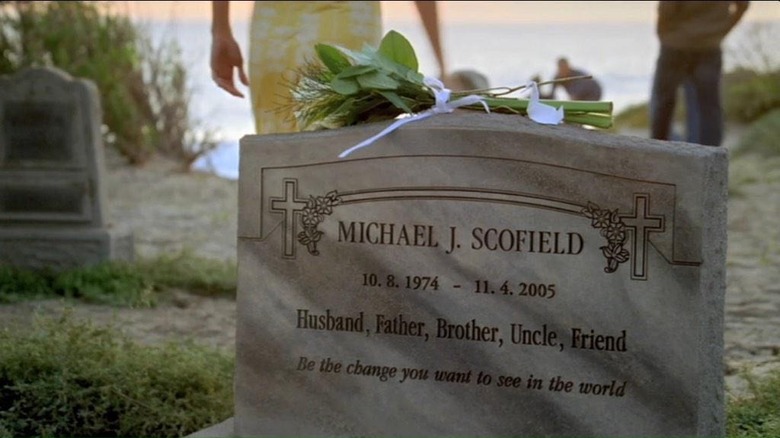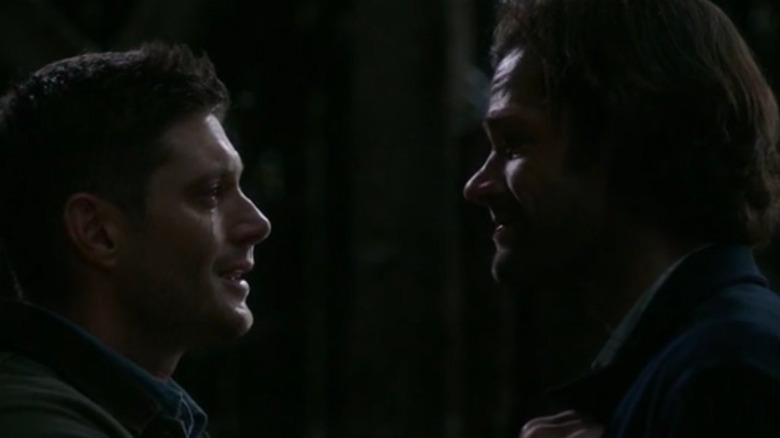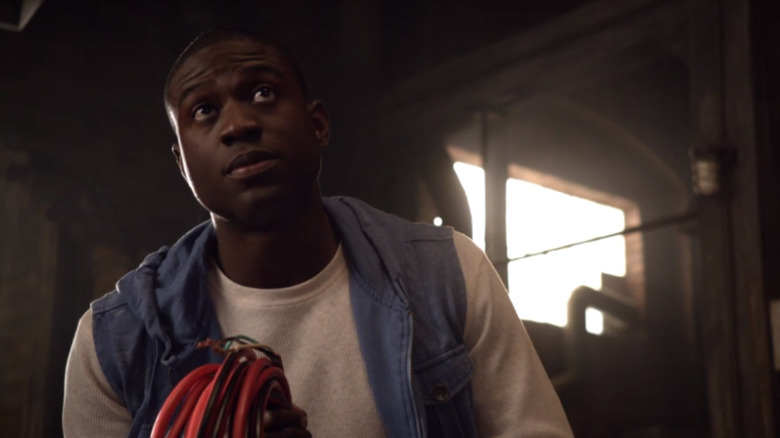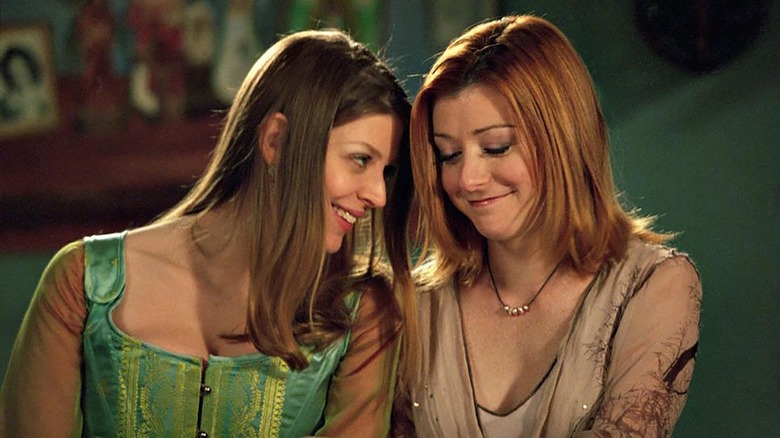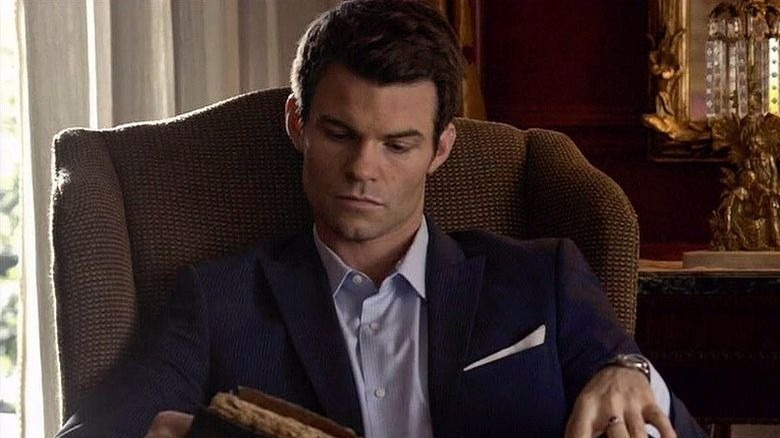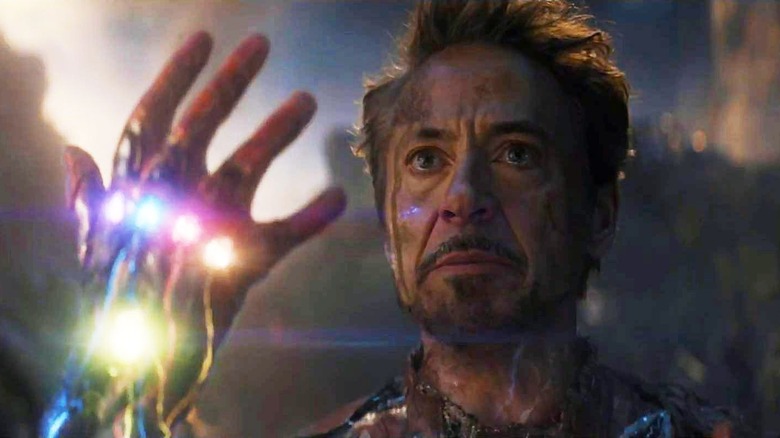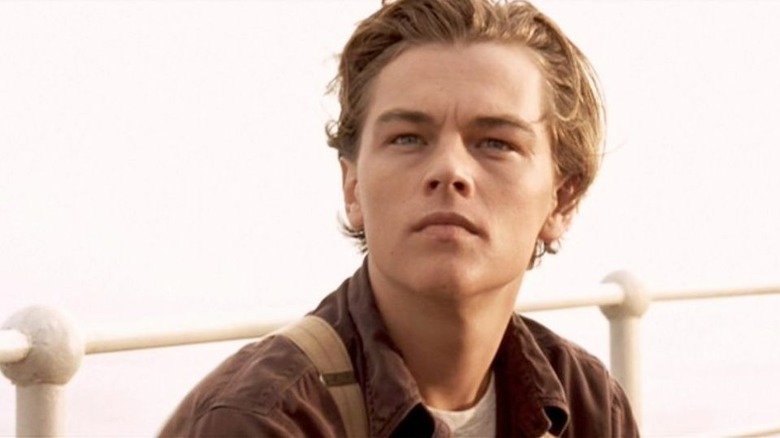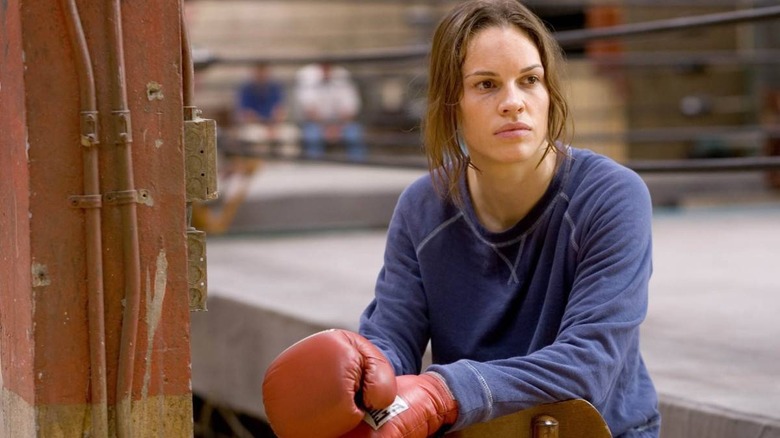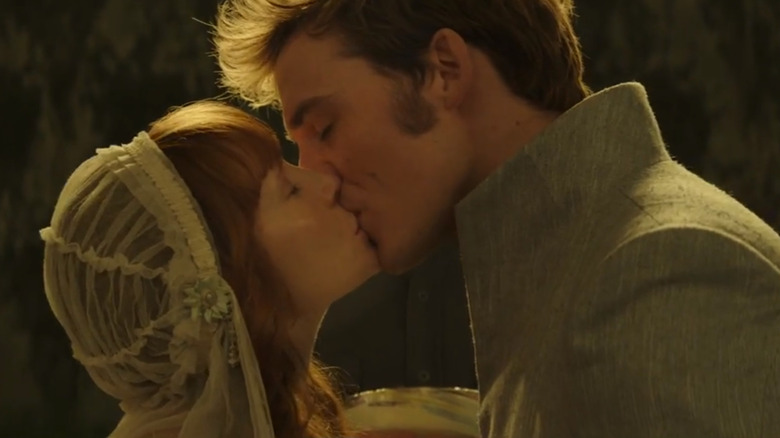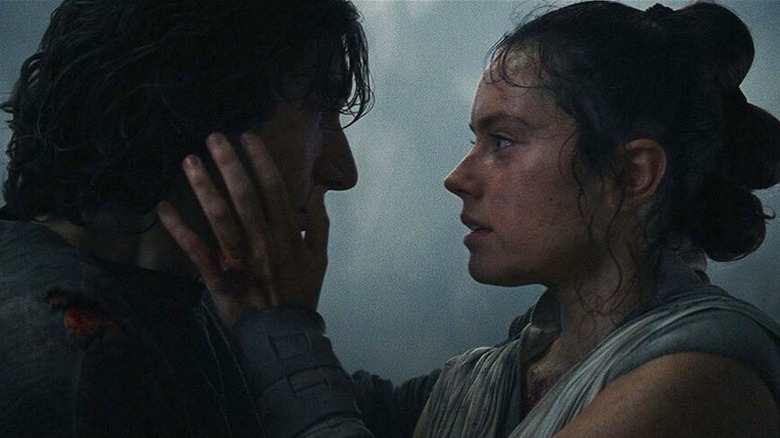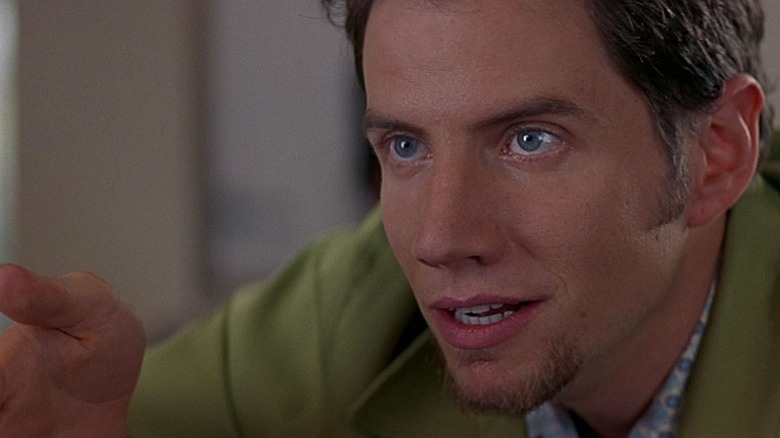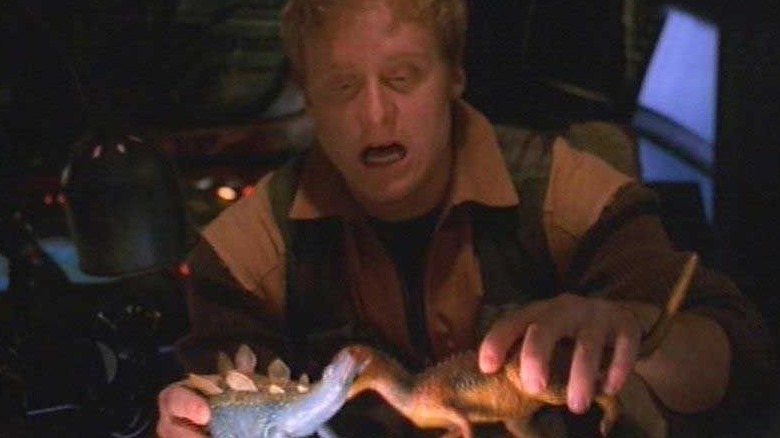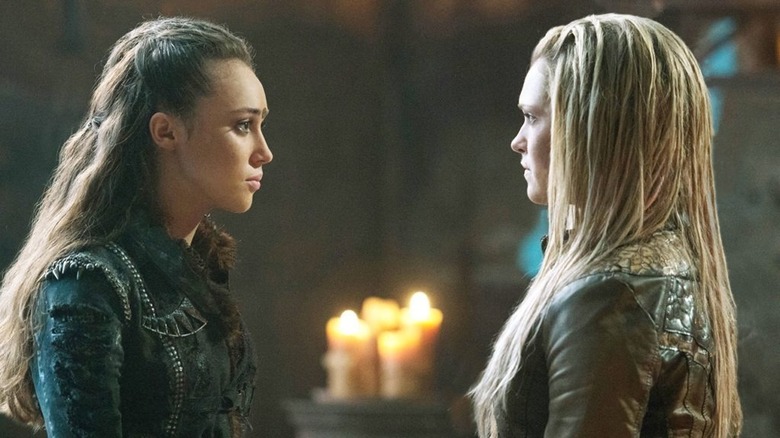Character Deaths That Felt Cheap To Fans
Fans are rarely happy about TV character deaths, unless it's a particularly annoying character or villain. When shows have to kill somebody off, it had better be earned — or else, the hashtags fly, the hate mail begins pouring in, and in some cases, the viewership goes down.
When it comes to cinematic deaths, things are a bit different. Since viewers have had minutes to bond with a character rather than dozens of hours, they seem less likely to treat them like a dear friend of the family; since most people watch movies start to finish, a film also has the advantage of being able to quickly justify the death through further plot developments. On TV, there's often a week (or more) of shock and anger before the next episode begins to hopefully bandage the open wound.
Taking into account both TV and films, here are some of the most outrageous, insulting, pointless deaths that Hollywood has ever brought to viewers. Buckle up, be prepared to get annoyed all over again, and feel free to start breaking out those angry hashtags now.
Marissa Cooper (The O.C.)
When it comes to non-supernatural teen dramas, you don't expect a show to kill off one of its four leads. It Girl Marissa Cooper's death in "The O.C.," however, shocked its fan base and led to the series' untimely Season 4 demise. After three years of jerking Marissa back and forth between childish behavior and character growth, she died at the hands of an ex who rammed into Ryan's car while he was taking her to the airport to seek out a better life.
"The O.C." set up the perfect way to write her off (leaving the door open for both Mischa Barton and Marissa to return) by having her plan to leave Newport to work on a boat with her dad. Instead, they dramatically killed her off. In addition to the moment being underwhelming for fans, Adam Brody made a great point on the "Welcome to the O.C., B******!" podcast that her grandiose death likely contributed to all of the rumors circulating that Barton was a diva.
"I don't think the way she was let go, killed, whatever was the best," Brody said (starting at 49:39). "And I mean it from a story perspective, but I also mean it for the psyche of a person that age ... could it have been handled differently? I think so." Most fans would likely back Brody up on that, as even writer Josh Schwartz has questioned his decision to kill her off.
Michael Scofield (Prison Break)
If you asked a "Prison Break" fan how they felt about the series finale back in 2009, they would likely launch into a rant about how the writers betrayed their trust — again. After unceremoniously chucking Sara's head into a box a la "Se7en" style, writers retconned that particular storyline after massive fan boycotts. However, when it came to the ending of the show, viewer retention no longer mattered. Many fans believe that Michael's ending was payback. In the finale, our merry band of misfit criminals finally defeated the cabal known as The Company, and Michael and Sara were happily expecting a child. They walked on the beach, joking about parenting styles, and then the show cut to four years later. Sara said to a now-toddler Michael Jr.: "Let's go see your daddy."
Fans likely expected a cute father-son moment, but instead were confronted by a headstone that read: "Michael J. Scofield." Say what? One of the most action-packed shows on TV made fans think everyone was getting a happy ending, only to pull out the rug at the 11th hour and kill the main character offscreen. But wait, it gets worse. To see what happened to Michael and to claim another payday from fans, the show immediately announced a straight-to-DVD movie entitled "The Final Break." To make matters worse, the writers decided to retcon his death (leaving dozens of plot holes) for yet another wave of paychecks. But they finally let Michael be happy, so please leave it that way.
Dean Winchester (Supernatural)
Everyone knows that hunters aren't long for the world of "Supernatural," and Dean Winchester has always said he wanted to go out swinging. Yet, did Dean's death by rebar really qualify as an epic death? If you asked most fans following the end of "Supernatural," the answer would be a resounding "no."
On the one hand, the idea of Dean giving his life to save two brothers does seem quite poetic. On the other, his immediate post-apocalypse death does negate some of the strides Dean made to have a life outside of hunting and to find self-worth despite his bravado. What's worse, Dean's fate seemed to be sealed after Castiel's declaration of love.
Either way, the show gave Dean little time between stopping the apocalypse and dying during a generic hunt. In some ways, it was a beautiful ending for him because it highlighted the fragility of life (especially as a hunter). Compounding the issue was the police application Sam found on his desk — suggesting that perhaps someday he would be ready to leave hunting behind, but he never got that chance. Fans are still upset over Dean's anticlimactic ending, with some arguing that having Dean survive the apocalypse and die a mundane vampire death was a slap in the face.
Vernon Boyd (Teen Wolf)
Derek Hale already felt guilty for the death of his whole family when he was 16, his sister when she came back to Beacon Hills, and pretty much everyone else he had ever loved. So when the "Teen Wolf" character created a pack of misfit werewolves, it was the closest thing he'd felt to a family since he was a kid. Of course, that meant the show had to take it away — and he had to play a role in doing it.
We met Boyd as a shy teenager who felt he had no place in the world, and viewers watched him blossom into the tough guy that he had always been underneath the surface. Just as Boyd was coming into his own, the Alpha Pack forced Derek to kill him and take his powers. The trauma it caused, for "Teen Wolf" viewers, was real.
Not only was Boyd's life cut short to seemingly add more torture for a main white character, but it marked a very gory, tragic end for one of the show's very few POC main characters. Honestly, Sinqua Walls and Boyd deserved better, so did Derek, and so did the fans.
Tara Maclay (Buffy the Vampire Slayer)
"Buffy the Vampire Slayer" changed TV in a number of ways, but the addition of Tara was groundbreaking for not only "Buffy," but TV as a whole. Queer representation had rarely existed onscreen previously, and lesbian representation was even more rare. Typically, when TV had allowed lesbian characters they were one-dimensional and more intended to titillate than educate.
Yet, Joss Whedon brought his viewers Tara and Willow, and they became one of few couples the LGBTQ+ community could see themselves in at the time. Unfortunately, the death of one half of the couple came as a major disappointment.
After a difficult breakup, they finally got back together — only for Tara to die almost immediately. Her death's purpose, it seemed, was purely plot-driven; Willow went on a rage-fueled path to become Dark Willow, while Tara became just another cliche, a fallen lover to avenge.
Elijah Mikaelson (The Originals)
While Klaus' intention to save his daughter Hope might be noble in "The Originals," there was simply no reason his brother Elijah had to die. Sure, you expect some guts, gore, and untimely deaths in a vampire show — however, with a primarily teen audience, some might see it as a bad idea to potentially glorify mental health struggles.
Whether that component of his demise was intentional or not, that's how it came across. Elijah, riddled with guilt and feeling like his life was meaningless, had the chance to work through those emotions. His death not only felt pointless, but it contradicted the fundamental characteristic that Elijah lived his life by: his nobility. Leaving his niece alone to mourn the deaths of almost everyone she'd ever loved, his death was a needlessly tragic end for one of the franchise's strongest characters.
If you or someone you know is struggling or in crisis, help is available. Call or text 988 or chat 988lifeline.org
Tony Stark (Avengers: Endgame)
There's no denying that Iron Man's death was one of the most impactful, hard-hitting casualties in the MCU. Some fans, however, weren't happy with the heart-tugging cherry on top of the so-called "Phase 3" movies.
When it came time to throw down the gauntlet against Thanos, Tony wanted nothing to do with the fight. He was busy at this point being a father, having found the domestic bliss he never really knew he wanted. Yet, because of his hero complex, he threw it all away to save the world.
In many ways, the death of Iron Man brought the entire MCU full circle. But did Tony not deserve to find the same happiness that Steve discovered in his final scenes? Did Tony Stark really have to die? Many fans would say no, and the reason is obvious: Robert Downey Jr.'s take on Tony Stark was quite possibly the most beloved actor/Marvel character pairing we've ever seen, and it really stung to say goodbye.
Jack Dawson (Titanic)
At this point, "Titanic" fans are well-versed in the rants about how much open space there was on Rose's escape door. Despite all that ample room on the door floating at sea, Jack needlessly sacrificed himself for Rose — who was self-centered throughout the film.
Kate Winslet's character regularly thought of herself first, cheated and threw temper tantrums. With that in mind, perhaps the wrong person made it out alive.
Of course, Rose's fiancé Cal was no peach — but her relationship with Jack could still be considered cheating, because she never did call off the engagement. More than two decades later, Jack's unnecessary death remains one of the most talked-about cinematic moments at which that fans roll their eyes.
Maggie Fitzgerald (Million Dollar Baby)
Hollywood loves to paint any differences that people might face as hurdles to be overcome — and disability is no exception. When it comes to characters dealing with a new paralysis diagnosis, Hollywood's solution is often death by choice. For obvious reasons, the trope can be perceived as sending a dangerous message. One of Anthony Mackie's best performances happened to fall prey to it, ruining an amazing movie in the eyes of some.
Throughout the film, Maggie (Hilary Swank) had been presented as a girl power icon, defying all expectations and showing that women could box just as well (sometimes perhaps even better) than the men who dominate the sport. But when a competitor employed illegal move, it left her paralyzed — and asking her mentor/father figure to kill her.
This final twist at the end of the film didn't anger everyone — after all, the film did earn $100 million domestically, become an instant classic, and win Oscars for Best Director (Clint Eastwood), Best Supporting Actor (Morgan Freeman), Best Actress (Swank) and even Best Picture — but in the eyes of some, the character deserved better. Maggie had a right to work through her grief, and her mentor shouldn't have to live with the guilt of murdering someone he loved. The film also features a stunningly abrupt ending that left audiences cold, one that never gave viewers her competitor being brought to justice.
Finnick Odair (The Hunger Games: Mockingjay Part 2)
While fans of the "Hunger Games" books may have expected Finnick's death going into the final movie, there was always hope that a movie adaptation might give the character a reprieve from his untimely demise in Suzanne Collins' pages. In actuality, his on-screen death was even worse — because Katniss caused it.
In the book, a dog bit Finnick's head off, causing Katniss to bomb the area. In the film, Finnick was screaming when she nuked the tunnel — and she never even attempted to save him. Sure, he was a goner at that point, but blowing up her heroic friend while he was still alive was a moment that didn't play well for "Hunger" fans. Although one could argue that Katniss saved Finnick from a long, painful death, it was very out of character.
As heroic as it may be, Finnick's death also served absolutely no purpose to the plot; despite being a source of tension and drama, it somehow still managed to be anticlimactic.
Ben Solo (Star Wars: The Rise of Skywalker)
It's a pretty difficult feat for a "Star Wars" project to surpass some of the overdramatic Skywalker-related scenes throughout the franchise's history, but "The Rise of Skywalker" somehow upped the ante. Cue the final scene between Rey and Ben, which managed to give Anakin "Drama Queen" Skywalker in all of his "I don't like sand" glory a run for his money. Rey and Ben basically played chicken between resurrecting each other from death, and despite what should have been a gut-wrenching scene, viewers couldn't help but laugh and roll their eyes. Ultimately, Ben did die, but the absurdity of the situation undercut any seriousness or emotional heft that the scene hoped to harness. What's worse, this death scene made a mockery of Leia's sacrifice.
Ridiculousness aside, Ben's death occurred almost immediately after renouncing his evil ways, cribbing Darth Vader's character arc note for note. While that might make sense after all we've learned about Ben's creepy obsession with grandpa Vader, it would have been much more brave to kill Rey instead — or at least, kill them both.
It would have been fascinating to watch the aftermath of a fallen Jedi live with their consequences — particularly when, like Vader, it led to the death of their greatest love. Instead, the death of Kylo Ren became more of the same.
Randy Meeks (Scream 2)
Few things are worse than having a beloved character survive a slasher movie and then get killed almost immediately in the sequel. In 1997's "Scream 2," resident horror aficionado Randy (Jamie Kennedy) ignored all of the rules he so painstakingly laid out in the first film — and the result was an unceremonious death that didn't even do anything for the plot.
The Randy of the first "Scream" would never be dumb enough to chat with a killer outside of a parked van. But "Scream 2" didn't even follow its own in-universe rules, giving Randy an early death and snuffing out all potential of the budding romance that some fans were itching to see between Sidney and Randy.
The bottom line? If you're going to kill off a slasher survivor — and the franchise's horror expert, who vicariously speaks for the audience, which made the first film so fun — there must be an extremely good reason for it. Hey "Scream 2," didn't you learn from Randy himself not to mess with the original?
Hoban Wash Washburne (Serenity)
Wash survived the original (albeit very short) series "Firefly," only to get needlessly (and graphically) killed off in the movie. "Firefly" fans adored Wash. He was a nerdy pilot who played with toy dinosaurs in his spare time. Who could dislike this absolute treasure of a human?
Additionally, he treated his wife Zoë like the queen she was, so people couldn't help but root for him. Wash was the antithesis of guys who blabber on about women spurning the "nice guy." Wash is the nice guy, so of course, he doesn't need to say it — and he got the girl. Yet, none of that was enough to save him from a pointless death that did absolutely nothing to advance the plot.
Wash's death scene wasn't only needlessly graphic (did we really need to see him impaled?), but it also came entirely out of nowhere. The moment appeared near the end of the film, serving as the series' conclusion, making its existence useless outside of torturing fans.
One theory for the beloved character's death was that Wash actor Alan Tudyk couldn't commit to more sequels. The notion of more sequels never amounted to anything more than whispers in the first place. So if that was the case, it was premature at best. Even more tragically, fans learned that Zoë was pregnant at the time of Wash's death, destroying any chance of him being able to someday play dinosaur toys with his child.
Lexa (The 100)
It's pretty rare for a showrunner to apologize for a character's death, but Lexa from "The 100" won that honor back in 2016, as fans voiced their displeasure over the character's death.
In the eyes of some, when Lexa (Alycia Debnam-Carey) was killed off, it did a disservice to the true nature of Clarke (Eliza Taylor), pushing her towards Bellamy (Bob Morley) and undermining the bisexual storyline. In his 2014 apology letter to the fandom, series creator Jason Rothenberg cited Debnam-Carey's departure from the show as a reason for her character's death — but admitted he should have handled things better.
"I've spent a great deal of time reading letters, blogs, tweets and articles from passionate women and men of all ages who were angered and saddened that the character Lexa was killed off immediately after a love scene with our hero Clarke," he wrote. "I'm still processing this. I'm still learning. But I have gained perspective and more than ever, I am profoundly grateful to you, our fans."
"The relationship between Clarke and Lexa was a positive step of inclusion. I take enormous pride in that," he continued. "The honesty, integrity and vulnerability Eliza Taylor and Alycia Debnam-Carey brought to their characters served as an inspiration for many of our fans. Their relationship held greater importance than even I realized."
Addressing fan concerns, Rothenberg said: "The end result became something else entirely — the perpetuation of the disturbing 'Bury Your Gays' trope. Our aggressive promotion of the episode, and of this relationship, only fueled a feeling of betrayal ... Those of us lucky enough to have a platform to tell stories have an opportunity to expand the boundaries of inclusion, and we shouldn't take that for granted."
